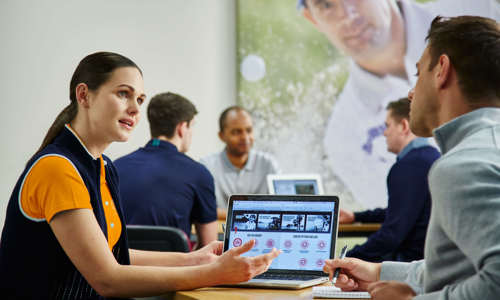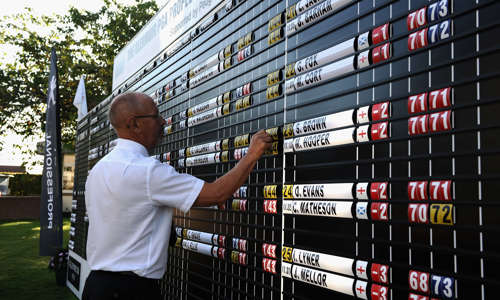How a dynamic partnership between Dr Noel Rousseau and Trevor Jones is slowly solving the puzzle of the yips.
Black with white stripes or white with black stripes? This age-old zebra conundrum perfectly captures an ongoing debate about the yips: Do technical flaws cause mental blocks, or do mental blocks create technical flaws?
For Yips specialist Dr. Noel Rousseau and Mental Performance Coach Trevor Jones, the bigger question isn’t which creates which but rather: How do we get this zebra moving in a meaningful direction?
Their holistic, multidisciplinary approach is showing real promise in an area of golf that has left countless players and coaches grasping for answers.
Bridging the gap: a more complete approach
Golfers suffering from the yips subconsciously try to force their way through the movement. This is where we see fluid or smooth motions suddenly replaced by clunky, learner-driver-type pull-aways. In the short game, the handle of the club often drives forward abruptly, causing the lead knee to buckle in a desperate attempt to find the ground.
The first step in their process is ruling out neurological causes.
Noel said: “A key question to ask is: Does this issue appear in other contexts? Does the yip action happen while drinking a cup of coffee? While writing or typing? If needed, we can refer to a neurologist colleague to assess and treat the medical side, while we focus on the psychological and motor components.”
Their integrated approach works like a three-way Venn diagram, overlapping their expertise with the client’s experience.
“We strive for an egalitarian, non-hierarchical relationship with the client,” says Noel. “Their life experience and context are every bit as important as the things we’ve learned.”
An initial session with Noel typically focuses on identifying where and how the movement is breaking down and offering the student a quick win.
“One of the key distinctions is whether the client is ‘yips-free’ in certain contexts,” says Noel. “If a client tells me, ‘I’m actually fine in practice or when playing alone,’ that’s a strong indication that psychology is involved, and I’ll bring Trevor into the conversation. For others, the technical issue is so clear that, to use Trevor’s driving/handbrake analogy, they’ve been driving so poorly that it’s no surprise a part of them has instinctively started pulling the handbrake.”
For many golfers, solid fundamentals and a clear concept of the correct movement will resolve the issue. However, when the problem persists despite good mechanics and understanding, that’s when the real head-scratching can begin.
ACE Driving: Acknowledge, Compose, Engage
Trevor and Noel have helped scores of golfers across different countries, age groups and skill levels.
“We recently worked with a young male golfer who’s struggled with this issue for five years and undoubtedly has the ability to reach the PGA Tour, win a major college event in the US,” said Trevor. “Although we historically think the yips is an issue for older players, in our experience, it’s highly contextual and can affect those you’d least expect.”
So how do you stop the handbrake from being pulled?
“I have to thank my good friend, and head of psychiatry for Major League Baseball, Dr. Jorge Aguilar MD,” said Trevor.
“We met at a psychology bootcamp in Denver two years ago, and he’s been a wonderful mentor ever since. With the yips also being an issue in baseball, we co-created the ACE driving formula,” said Trevor.
ACE stands for Acknowledge, Compose, Engage
“When clients are struggling with this issue, it can be like driving in thick fog. The clear technical instruction they’ve been given becomes impossible to see, hidden in a system now overwhelmed with panic,” says Trevor.
“Acknowledging your experience is incredibly liberating for clients who have been running, fighting, hiding from, or trying to control this for a long time.”
A first session with Trevor typically involves an exercise called ‘Find the Handbrake,’ where the client somatically locates the epicentre of their issue using a super slow-motion version of their movement.
“To get a little geeky for a moment, the game-changer with clients typically comes through something called systematic interoceptive exposure, or as I call it, ‘finding the handbrake and exploring the emotional dashboard’. This process helps reestablish a sense of trust in one’s own body.”
Changing the narrative
Trevor and Noel foster transparency and open communication with clients via WhatsApp groups.
“Clients really appreciate our multidisciplinary approach, where each session informs the next in a reticulating fashion,” Noel explains. “That togetherness in tackling the issue is quite powerful.”
Unlike our zebra friend, this struggle is rarely black and white. Humans are complex, with complicated histories and relationships with themselves and their performance. However, this dynamic new approach seems to be turning the tables on a struggle once seen as career-ending. There may just be reason to be hopeful after all.
What golfers say about Trevor and Noel’s approach
“I developed the chipping yips as a teenager and after struggling for nearly 20 years, and having tried pretty much everything with little success, Noel and Trevor have been a godsend. Their approaches complement one another beautifully. I feel better on and off the course. I’m hitting shots I haven’t hit since I was a kid and I’m even back playing competitions”
- Craig Loxton, former PGA trainee
“I’ve struggled with my short game since the late 90s, when I was playing elite amateur golf. I’ve had a sense of dread in my short game for as long as I can remember, always watching out for the ‘golfing devil’ as I called it. At one point I even tried hypnosis, without much luck. Working with Trevor and Noel has made a real difference. I still sometimes pinch myself at the transformation”
- Derek Paton, Scottish Senior International, Irish and Scottish Senior amateur champion




































